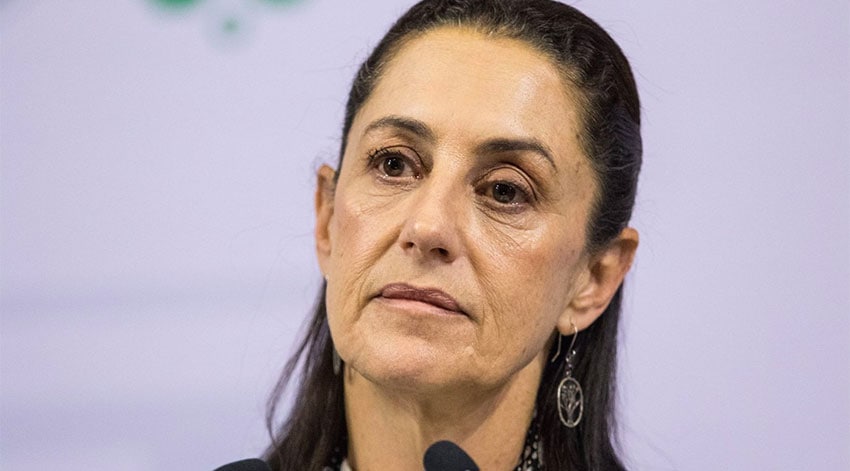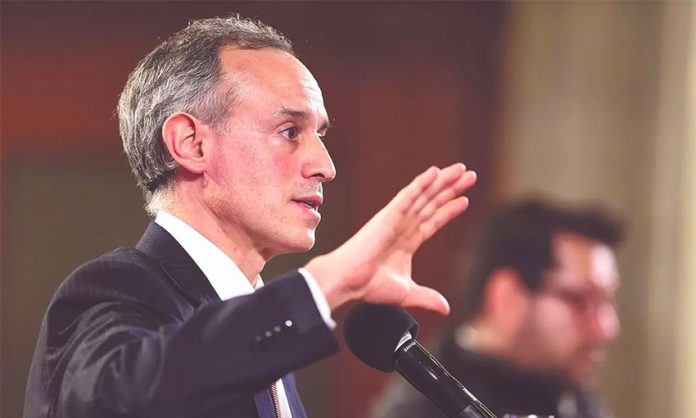Deputy Health Minister Hugo López-Gatell has rejected a report that claimed that the federal government misled citizens about the severity of the coronavirus situation in Mexico City.
The New York Times published a report Monday that said López-Gatell signed a document that notified Mexico City Mayor Claudia Sheinbaum about the risk level in the capital on December 4.
The figures for hospital occupancy in Mexico City and the capital’s Covid-19 positivity rate on the document were lower than published official data. The lower figures allowed the federal government to avoid having to designate Mexico City as a red light “maximum” risk state at the start of December.
The capital consequently remained “high” risk orange on the stoplight map until last Saturday when red light restrictions were implemented.
Speaking at the Health Ministry’s coronavirus press briefing on Monday night, López-Gatell asserted that “there are several information holes” in The New York Times report.
“They took partial information [and] interpreted it without correct knowledge of the situation [and] the multiple mechanisms we have … to make the stoplight rating,” he said.
However, the coronavirus point man didn’t deny that there was a discrepancy between the information on the document he signed and official data that was published.
Natalie Kitroeff, the Times reporter who wrote the story, published a copy of the document on her Twitter account, writing: “Here is the document Hugo López-Gatell sent to Claudia Sheinbaum justifying keeping the city open. The numbers for hospital beds with ventilators and % positivity of Covid tests are both lower than what he and the govt. published.”
López-Gatell said that another imprecision of the report is “a vision” that Mayor Shienbaum and the federal government are not on the same page with regard to management of the pandemic.
“That’s not the case. Fortunately in the case of the metropolitan region we can … work together,” he said.
In addition, the deputy minister charged that the Times misinterpreted remarks he recently made about the stoplight color allocated to Mexico City.

The newspaper said that “López-Gatell has recently tried to minimize the importance of the traffic light system that he created and championed,” noting that he stated December 11 that “the color of the traffic light is at a certain point irrelevant.”
The coronavirus czar said Monday that his remark that the stoplight color was “at a certain point irrelevant” in no way meant that that the stoplight system itself was irrelevant.
“I said very clearly that the stoplight color we’re on [in Mexico City] is irrelevant to a certain point when we’re declaring alert for Covid, emergency for Covid. … When we declared alert for Covid, or more precisely when the Mexico City government declared alert for Covid, emergency for Covid, and issued a series of specific recommendations that correspond to lockdown measures, the color of the stoplight is irrelevant, not the tool of the stoplight [system]. It never stopped being relevant, never. It continues to be in use,” López-Gatell said.
Prior to Mexico City turning red on the stoplight map, the Mexico City government added an “alert” warning to the capital’s orange light designation.
Continuing his rebuttal of the Times report, López-Gatell said the vast majority of the coronavirus data presented by the federal government comes from statistics supplied to it by the states.
Therefore, “another of the imprecisions of this article is the idea that Mexico City couldn’t react because it didn’t have information. That’s not the case. The information that the federal government has comes from Mexico City,” he said.
“Besides, … Mexico City not only was able to react, it did react and reacted very well.”
The Times, however, didn’t say that the Mexico City government didn’t have the information it required to “react.”
Indeed, it said that Sheinbaum “could have broken with the federal government and put the city on lockdown earlier.”
However, the newspaper said “that move would have been politically risky” because the mayor has close ties to President López Obrador, who has “minimized the pandemic from the start.”
It is not the first time that López-Gatell has taken issue with a New York Times report about coronavirus in Mexico. In May, he rejected a report that the federal government was not reporting hundreds or possibly thousands of Covid-19 deaths identified by authorities in Mexico City.
Evidence that subsequently came to light, including an analysis of death certificates issued in the capital up until the middle of May, indicated that the Times‘ assertion was correct.
The newspaper’s latest report about coronavirus in Mexico also triggered a response from Mayor Sheinbaum.
She said the media has been reporting on alleged differences between her government and the federal government since the start of the pandemic but claimed “they’re completely wrong because there has been permanent coordination.”
Sheinbaum said her government provided an email to the Times reporter that established that Mexico City determined – just as the federal government did – that the capital would remain at the orange light level for the two weeks starting December 7.
The Times and other media are looking for “confrontation,” the mayor said. “They can publish anything [they want] but it’s important that our version [of events] is given.”
Source: Milenio (sp), El Financiero (sp)
